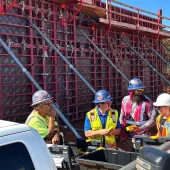Formwork manufacturer Peri have launched a staff toolkit in a bid to raise awareness of menopause in the workplace as part of its series of wellbeing-related topics.The company said the toolkit aims to normalise the conversation around menopause in the construction industry by offering dedicated support and resources to its employees.
Although there is currently no legal requirement for it to be included as part of an employee’s contractual agreement, Peri believes that menopause is a topic that needs to be addressed, as it affects almost half of the working population.
Emma Quin, senior HR business partner, Peri UK says: “Research shows that around 75% of women will experience symptoms during menopause, with 25% of women experiencing severe symptoms that can have a big impact on their day-to-day life. If we are serious about making the industry a place where women can thrive equally, then we need to put these adjustments in place and be open to having conversations about menopause. We want to be recognised as a diverse and inclusive employer, and we are determined to retain and increase the female talent in our business.”
While construction remains a male-dominated industry, the number of women working in the industry is slowly growing. According to a recent report by the UK’s ONS (Office for National Statistics), women accounted for 15.8% of the workforce in 2023.
As part of its proactive approach, Peri recently introduced its Menopause Toolkit, which provides guidance for employees and line managers.
The action plan also includes flexible working opportunities to remove any barriers that prevent employees from feeling their best at work.
“We will be encouraging employees to arrange welfare meetings with HR and their manager if they need support. This also means guiding managers on how to accommodate employees' requirements in the workplace so that we can achieve the best possible outcome together,” said Quin.
The initiative is being driven by Peri’s Wellbeing Team, with some of its members even undertaking training on the topic to make support in the workplace more accessible for all.







